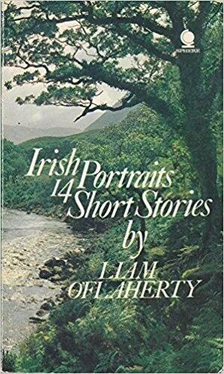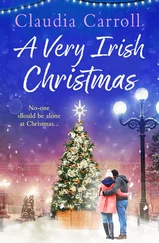Martin looked after him angrily as he went out. He muttered to himself:
“We could buy a lot of paraffin with all the money he spends on drink and chasing after every strip of a woman in the parish.”
When Patrick returned with the chips, he said:
“This is no life, returning hungry to an empty house.”
“I’ve heard you say that often enough,” said Martin. “We weren’t put on this earth to enjoy ourselves, but to save our souls.”
“Ach!” said Patrick sourly, as he stooped over the fire with the chips. “A man would be better dead than listening to your grumbling.”
“Who is doing the grumbling?” said Martin.
“That’s enough of it,” said Patrick. “That’s enough now. Be putting the things on the table.”
“I’ll take off my wet things first,” said Martin. “’Twill be years before that kettle boils.”
He began to strip off his clothes.
The fire blazed up, making a brighter light than the tin paraffin lamp that hung on a nail in the wall. The delft on the dresser shone. Now there was no smoke. Patrick shut the door. Then he too began to strip.
“These three years since mother died,” he said, “are worse than all the hardship I ever had in my life. A house without a woman is worse than hell.”
“Say Lord have mercy on her, when you speak of her,” said Martin.
“Every damn thing I say, you pick me up,” shouted Patrick. “What have you against me? Eh?”
Naked, Martin walked to the hearth and took dry clothes from a line that stretched across the chimney.
“Mind that kettle,” he said. “It’s going to boil.”
They both dressed in dry clothes and hung their wet ones on the line. They laid the table for a meal of tea and bread and butter. Patrick made tea. They sat down to eat. The table was without a cloth. The cups had no saucers. The loaf lay on the naked board. The butter was also lying on the board, with a bedraggled thin paper about it. The milk lay in the three-quart can into which it had been strained.
They ate hurriedly, in silence. Then Patrick went on to the hearth to refill his cup from the teapot. At the fire he said:
“I’m not going to stick this any longer. One of us has to stir.”
“Pour some into this,” said Martin, reaching over his cup.
Patrick returned to the table and continued to eat. He kept glancing at his brother furtively, his white eyebrows moving up and down.
“What did you say?” he muttered after some time.
“Me?” said Martin. “I said nothing.”
“Didn’t you hear what I said?”
“What did you say?’
“I said it was time for one of us to get married.”
Martin pushed away his empty cup, put the can of milk to his head and drank a large quantity of the milk. He wiped his mouth, crossed himself and went to the fire.
“You have something on your mind,” he said. “Out with it.”
He took a piece of tobacco from his waistcoat pocket and bit it. Patrick also drank some of the milk, crossed himself, put on his cap and came to the fire. He lit his pipe with a coal. They both sat in silence, on stools, one smoking his pipe, the other chewing.
“Well!” said Martin at length, spitting into the fire. “Out with it.”
“Well!” said Patrick. “I have this on my mind. It’s time for one of us to bring in a woman here. A man would be better dead than living this way. There’s nobody to clean or wash or get a meal ready for us after the day’s work. We haven’t had a pig this last year. There’s money lost. Potatoes are going to rot in the barn. I’d rather let them rot than sell them for the few shillings they give for them in the shops. We could feed ten pigs in the year. Sheep too. We can’t keep a sheep because we have no time to run after them over the rocks. We’re losing money, along with the loneliness and misery of an empty house.”
“Money!” said Martin. “You can’t bring it to the grave with you. Haven’t we enough to eat? But you may do as you please. You’ve been driving at this a long time and I’d rather have anything than hearing all the tongues in the parish jeering at our name on account of your blackguarding.”
“What blackguarding?” said Patrick angrily.
“You and Kate Tully,” said Martin in a loud voice. “You follow her wherever she goes.”
“Well!” said Patrick. “I’ll follow her no longer. And less of your tongue, I’m telling you. You don’t know what you’re saying.”
“How?”
“How? This is how. I asked her coming up the road and she agreed.”
Martin spat his chew into the fire, looked at his brother with open mouth and then said:
“Tare an’ ouns! You asked Kate Tully to marry you?”
“I did. What about it?”
Martin’s face suddenly lost its angry look. His eyes became sad and weary. His jaw dropped.
“Eh?” said Patrick. “What’s the matter? Were ye … were ye thinking of asking her yerself?”
“Me?” said Martin, flushing and raising his head. “I’d rather lie with a dog than with the woman,” he added fiercely.
“Be careful of what you are saying,” said Patrick in a low voice.
“I’ll say what’s in my mind,” said Martin. “Now is the time to say it, isn’t it? She’s been fifteen years in America without tale or tidings of her. Then she returned last year with a boy and no husband.”
“Her husband is dead,” said Patrick angrily. “What are you driving at?”
“Maybe he is,” said Martin. “A woman doesn’t go about here with a painted face, though, if she is right. What for does she paint her face and lips and terrify every decent man with her language and her free ways, unless …”
“Unless what?”
Martin shuddered and became silent. Patrick was watching him with glittering eyes.
“God knows,” said Martin sadly, “it’s hard to think badly of her, after what she was before she went away. Ye’d stand in the snow looking at her lovely face and she was so shy and modest that she blushed when a man bid her the time of day. Now she is…. Ach!”
“Now, listen to me here,” said Fatrick. “I’ve had enough of this. Remember what I’m saying. I’m going to marry Kate Tully. If you don’t like it, there’s the door. You can take your share of the land and money and get a wife for yourself.”
“You’re not marrying her,” said Martin. “You’re marrying her fortune of three hundred pounds.”
“Well, there you are now,” said Patrick. “Think over it. I’ll have no argument. I’ve wasted the best of my life, each of us watching the other. You always had a sour mouth whenever I thought of a woman. But I’ll wait no longer.”
“Marry her then,” said Martin, jumping to his feet. “Marry her. But I’ll stay here. This is my father’s house. You can’t put me out of it. Marry her and the devil take you and her.”
He strode to the door. Patrick jumped up and shouted:
“Where are you going? Take back what you said.”
Martin turned back and looked at his brother gloomily. Then he shuddered, bent his head and murmured sadly:
“I’m sorry, Paddy. I… I… Tomorrow we can … I’ll go out for a bit.”
He went out. Patrick sat down again by the fire and smoked. His face twitched. Then he also jumped to his feet and left the house. He visited his uncle. He returned at midnight and went to bed. Martin had not yet returned. At two o’clock in the morning he was awakened by hearing Martin come into the room.
“Where were you till this hour?” he said.
“I was over to the cliffs to see was there any wreckage,” said Martin.
“How could you see in the dark, man alive?”
“Never mind,” said Martin. “I was listening to the sound of the sea.”
“Ugh!” said Patrick, turning towards the wall. “You’re out of your head.”
Читать дальше












